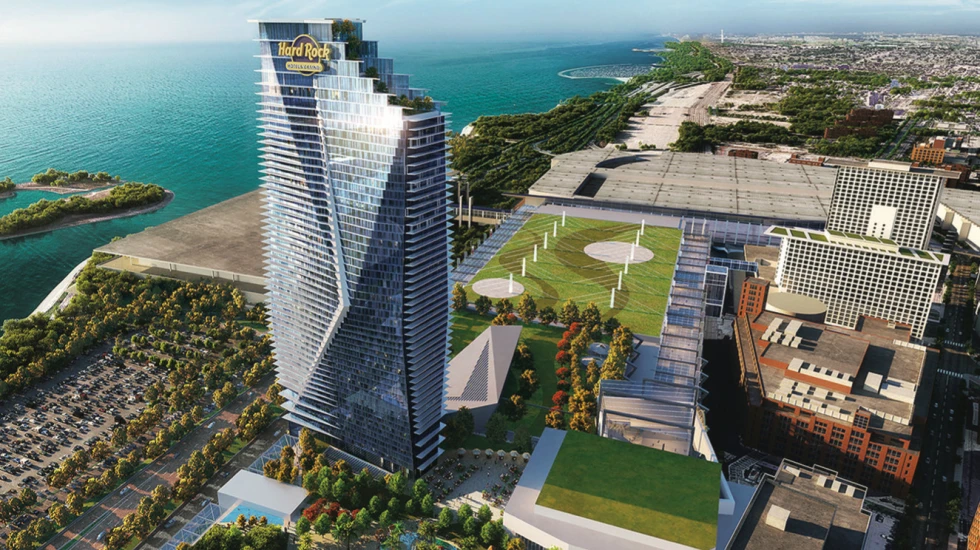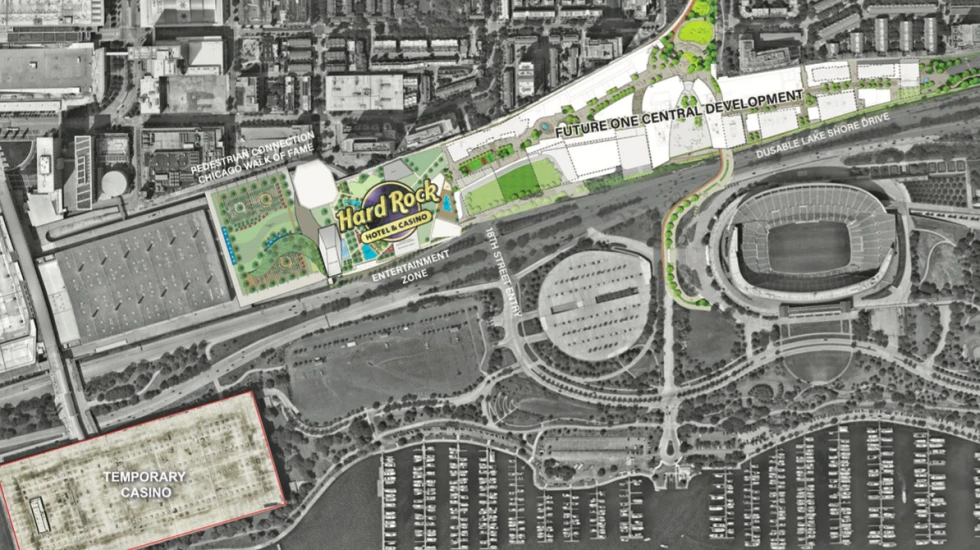
A wild card in Chicago’s deck of possible casino developers on Tuesday tried to win over a packed auditorium of South Loop residents expressing concern over increased traffic and crime potentially “destroying the quality of life” in their neighborhood if the city’s long-sought gambling house is placed near Soldier Field.
Representatives for the proposed Hard Rock Chicago touted the group’s minority investment commitment, business acumen and community connections while pitching their plan to build a casino over the Metra tracks next to Du Sable Lake Shore Drive near 18th Street.
Hard Rock is one of three finalists chosen by Mayor Lori Lightfoot to land the coveted Chicago casino license. The developers put their chips on the table before a 385-capacity crowd at Harold Washington Library in the first of three public presentations by the finalists set to be delivered this week in their respective host communities.

Hard Rock’s pitch was initially viewed in industry circles as a long shot to land the bid because of its ties to a massive, adjacent development that relies on $6.5 billion in public funds from the state that haven’t been approved. That development, dubbed One Central, envisions a gigantic retail center and transit hub — and already faces significant community opposition.
The Hard Rock development group has said its proposal will move forward regardless of whether the full One Central project comes together, but residents told executives Tuesday it’s still front of mind.
“You put together a comprehensive proposal, but One Central is the millstone around your neck,” one resident said during a contentious Q&A session, voicing the issue that drew the most responses to the city’s written-submission question format. “The community doesn’t want it.”
Bob Dunn of Landmark Development — who’s behind the One Central proposal and part of the Hard Rock group that also includes the Florida-based gambling giant and Chicago-based Loop Capital — reiterated his group’s insistence that their $1.7 billion casino project can proceed with or without the publicly funded project.
“Hard Rock Chicago is in no way tethered to the development or financing of the broader One Central project,” Dunn said. “They’re distinct projects.”
Hard Rock International CEO Jim Allen went further, saying “we have nothing to do with the massive project” — and noting that the casino would be fully funded by corporate coffers and private loans, not taxpayer money.
But the specter of One Central and the potential complications of the site is also on the minds of city officials who have evaluated their project.
In a report issued last month when Lightfoot narrowed down the casino finalists to five, city officials wrote that the corporation’s timeline “may be aggressive” given the red tape to break ground.
On its own, the casino would need approvals from the Illinois Department of Transportation, Metra, and the Metropolitan Pier and Exposition Authority, which manages McCormick Place. The Hard Rock site butts up against the north end of the sprawling expo complex.

“The significant number of approvals needed creates execution risk to this proposal and the possibility for construction delays,” the city report says.
But city officials also figure Hard Rock could churn out an estimated $185.3 million for the city annually — the second-highest of the three finalists. City tax revenue from the casino is earmarked for its depleted police and firefighter pension funds.
The Hard Rock plan also calls for a 3,500-seat music venue, a 500-room hotel plus outdoor green space.

Loop Capital CEO Jim Reynolds said their group would have “unprecedented levels of minority investment,” with half of the ownership group including Black and Brown investors. Minority investment is among the priorities Lightfoot has listed in her selection process.
Other residents provided written comments decrying the project for “threatening the quality of life in the neighborhood” due to more traffic and noise.
Those issues are also sure to be raised at public hearings for the other finalists: a proposed Bally’s casino at the River West printing plant of the Chicago Tribune; and a Rivers casino aiming for the South Loop plot of land known as The 78, south of Roosevelt Road and west of Clark Street.
The mayor has put together a City Council committee to narrow down to one finalist within the next few months. That bidder would then have to apply for state approval.
The Bally’s presentation will take place Wednesday at the Tribune site, 700 W. Chicago Ave. The Rivers 78 site will be discussed Thursday at UIC’s Dorin Forum, 725 W. Roosevelt.







